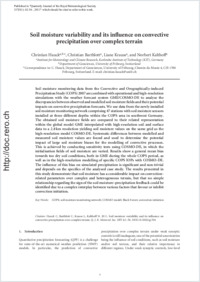Soil moisture variability and its influence on convective precipitation over complex terrain
- Hauck, Christian Institute for Meteorology and Climate Research, Karlsruhe Institute of Technology (KIT), Germany - Department of Geosciences, University of Fribourg, Switzerland
- Barthlott, Christian Institute for Meteorology and Climate Research, Karlsruhe Institute of Technology (KIT), Germany
- Krauss, Liane Institute for Meteorology and Climate Research, Karlsruhe Institute of Technology (KIT), Germany
- Kalthoff, Norbert Institute for Meteorology and Climate Research, Karlsruhe Institute of Technology (KIT), Germany
-
09.02.2011
Published in:
- Quarterly Journal of the Royal Meteorological Society. - 2011, vol. 137, no. S1, p. 42-56
English
Soil moisture monitoring data from the Convective and Orographically-induced Precipitation Study (COPS) 2007 are combined with operational and high-resolution simulations with the weather forecast system GME/COSMO-DE to analyse the discrepancies between observed and modelled soil moisture fields and their potential impacts on convective precipitation forecasts. We use data from the newly installed soil moisture monitoring network comprising 47 stations with soil moisture sensors installed at three different depths within the COPS area in southwest Germany. The obtained soil moisture fields are compared to their related representation within the global model GME interpolated with high-resolution soil and surface data to a 2.8 km resolution yielding soil moisture values on the same grid as the high-resolution model COSMO-DE. Systematic differences between modelled and measured soil moisture values are found and used to determine the potential impact of large soil moisture biases for the modelling of convective processes. This is achieved by conducting sensitivity tests using COSMO-DE, in which the initialisation fields of soil moisture are varied. Results show a general mean bias towards too dry soil conditions, both in GME during the whole COPS period, as well as in the high-resolution modelling of specific COPS IOPs with COSMO-DE. The influence of this bias on simulated precipitation is significant and non-trivial and depends on the specifics of the analysed case study. The results presented in this study demonstrate that soil moisture has a considerable impact on convection-related parameters over complex and heterogeneous terrain, but that no simple relationship regarding the sign of the soil moisture–precipitation feedback could be identified due to a complex interplay between various factors that favour or inhibit convection initiation.
- Faculty
- Faculté des sciences et de médecine
- Department
- Département de Géosciences
- Language
-
- English
- Classification
- Meteorology, climatology
- License
-
License undefined
- Identifiers
-
- RERO DOC 22279
- DOI 10.1002/qj.766
- Persistent URL
- https://folia.unifr.ch/unifr/documents/301951
Statistics
Document views: 115
File downloads:
- pdf: 524
